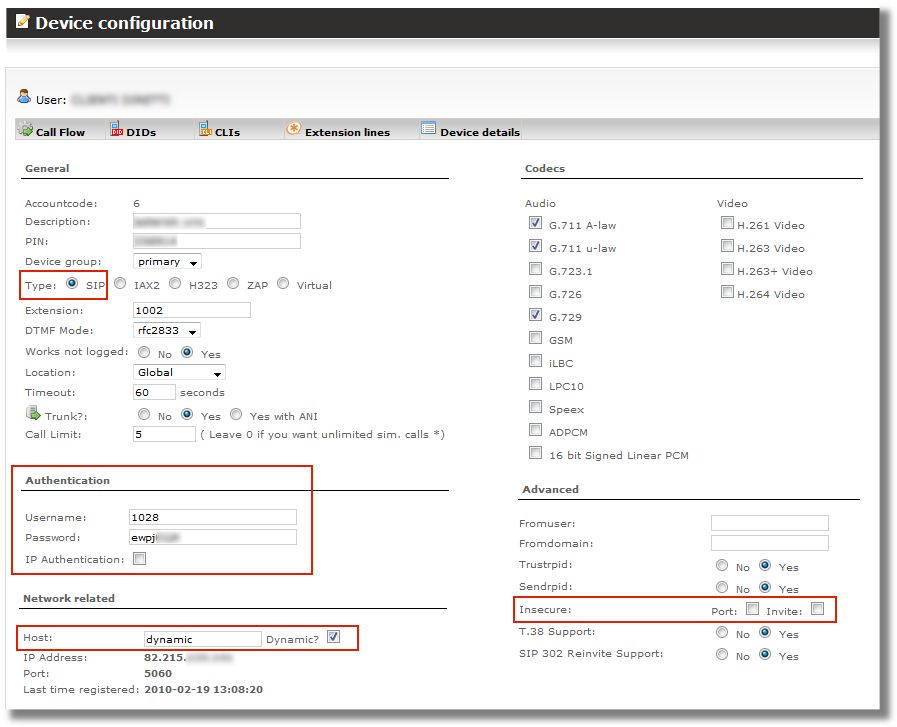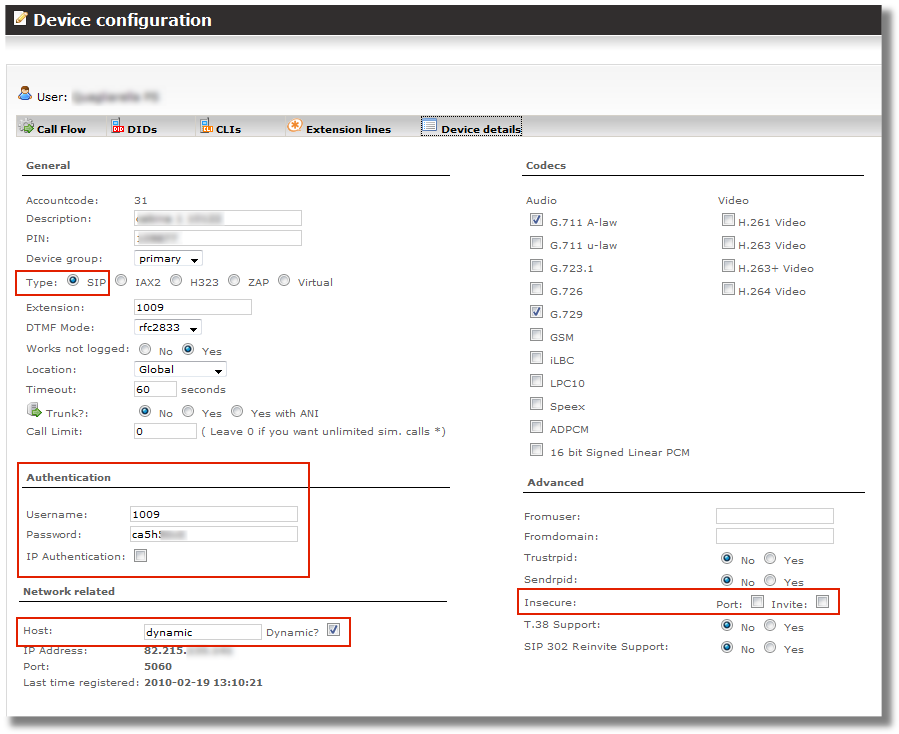Difference between revisions of "How to make several connections from one IP"
| (13 intermediate revisions by 2 users not shown) | |||
| Line 1: | Line 1: | ||
= Description = | = Description = | ||
In order to separate traffic, it is sometimes necessary to make several connections to MOR from one IP (usually a server). | |||
The main rules for how to do this are: | |||
# Devices should be DYNAMIC and should REGISTER to MOR | # Devices should be DYNAMIC and should REGISTER to MOR. | ||
# In INVITE packet from external server | # In [[Device settings | Device settings]] enable Insecure Port and Invite | ||
# In the INVITE packet from the external server, which device is dialing should be visible in the '''From:''' line. (If the external server is Asterisk, then in the MOR descriptions (in sip.conf file) on the external server, there should be fromuser= lines that point to which device is dialing. ''Check explanation in details below''). | |||
If devices are not configured properly, then call from external server to MOR is possible, but only | If the devices are not configured properly, then a call from external server to MOR is possible, but only one device will be billed all the time or only one trunk will be active (it depends on the misconfiguration). | ||
Possible error on misconfiguration: | Possible error on misconfiguration: | ||
| Line 16: | Line 17: | ||
<br><br> | <br><br> | ||
= SIP INVITE packet = | = SIP INVITE packet = | ||
As described previously correct SIP INVITE packet should be received in order for MOR to | As described previously, the correct SIP INVITE packet should be received in order for MOR to authenticate the user correctly. | ||
== Good SIP INVITE packet == | == Good SIP INVITE packet == | ||
| Line 24: | Line 26: | ||
INVITE sip:3908155xxxxx@82.215.xxx.xxx SIP/2.0 | INVITE sip:3908155xxxxx@82.215.xxx.xxx SIP/2.0 | ||
Via: SIP/2.0/UDP 82.215.xxx.xxx:5060;branch=z9hG4bK50ef8b9b;rport | Via: SIP/2.0/UDP 82.215.xxx.xxx:5060;branch=z9hG4bK50ef8b9b;rport | ||
From: "39081761xxxxx" <sip:<big>'''1028'''</big>@82.215.xxx.xxx>;tag=as3b117c95 | From: "39081761xxxxx" <sip:<big><big><big>'''1028'''</big></big></big>@82.215.xxx.xxx>;tag=as3b117c95 | ||
To: <sip:390815517304@82.215.xxx.xxx> | To: <sip:390815517304@82.215.xxx.xxx> | ||
Contact <sip:1028@82.215.xxxx.xxx> | Contact <sip:1028@82.215.xxxx.xxx> | ||
| Line 38: | Line 40: | ||
== Bad SIP INVITE packet == | == Bad SIP INVITE packet == | ||
INVITE sip:3908155xxxxx@82.215.xxx.xxx SIP/2.0 | |||
Via: SIP/2.0/UDP 82.215.xxx.xxx:5060;branch=z9hG4bK7edd0b9e;rport | |||
From: "3908176xxxxx" <sip:<big><big><big>'''3908176xxxxx'''</big></big></big>@82.215.xxx.xxx>;tag=as1b7e883e | |||
To: <sip:3908155xxxxx@82.215.xxx.xxx> | |||
Contact: <sip:3908176xxxxx@82.215.xxx.xxx> | |||
Call-ID: 1efdd14505519d1a6b769e5c269f555d@82.215.xxx.xxx | |||
CSeq: 103 INVITE | |||
User-Agent: Asterisk PBX | |||
Max-Forwards: 70 | |||
Proxy-Authorization: Digest username="1028", realm="asterisk", algorithm=MD5, uri="sip:3908155xxxxx@82.215.xxx.xxx", nonce="0f96c765", response="df7b502821c03ad43222d007b20dbf84", opaque="" | |||
Date: Fri, 19 Feb 2010 12:17:41 GMT | |||
Allow: INVITE, ACK, CANCEL, OPTIONS, BYE, REFER, SUBSCRIBE, NOTIFY | |||
Content-Type: application/sdp | |||
Content-Length: 242 | |||
<br><br> | <br><br> | ||
= Example = | = Example = | ||
Let's say we have MOR and another Asterisk server from which we want to configure two connections to MOR. | |||
<br><br> | |||
== MOR configuration == | |||
First, on MOR we need to describe such connections as Devices for different Users. | |||
We will create two devices, 1028 and 1009, for these connections: | |||
(Important parts are marked in RED) | |||
[[Image:device_from_sameip1.png]] | |||
[[Image:device_from_sameip2.png]] | |||
<br><br> | |||
== Remote server configuration == | |||
The remote server in our example is Asterisk, so its configuration should be in sip.conf file, which describes both connections and registers to MOR: | |||
[general] | |||
register => 1028:ewpjxxxx@82.215.xxx.xxx/1028 | |||
register => 1009:ca5hxxxx@82.215.xxx.xxx/1009 | |||
[authentication] | |||
[mor1028] | |||
canreinvite=no | |||
host=82.215.xxx.xxx | |||
user=1028 | |||
username=1028 | |||
secret=ewpjxxxx | |||
type=peer | |||
''fromuser=1028'' | |||
[mor1009] | |||
canreinvite=no | |||
host=82.215.xxx.xxx | |||
user=1009 | |||
username=1009 | |||
secret=ca5hxxxx | |||
type=peer | |||
''fromuser=1009'' | |||
<br><br> | |||
= Limitations = | |||
It is not possible to send CallerID from a remote server this way, because "fromuser" overwrites the CallerID field. | |||
You can only hardcode CallerID in MOR for every user account. | |||
Latest revision as of 11:35, 22 August 2011
Description
In order to separate traffic, it is sometimes necessary to make several connections to MOR from one IP (usually a server).
The main rules for how to do this are:
- Devices should be DYNAMIC and should REGISTER to MOR.
- In Device settings enable Insecure Port and Invite
- In the INVITE packet from the external server, which device is dialing should be visible in the From: line. (If the external server is Asterisk, then in the MOR descriptions (in sip.conf file) on the external server, there should be fromuser= lines that point to which device is dialing. Check explanation in details below).
If the devices are not configured properly, then a call from external server to MOR is possible, but only one device will be billed all the time or only one trunk will be active (it depends on the misconfiguration).
Possible error on misconfiguration:
WARNING[2836]: chan_sip.c:8385 check_auth: username mismatch, have <XXXX>, digest has <YYYY>
SIP INVITE packet
As described previously, the correct SIP INVITE packet should be received in order for MOR to authenticate the user correctly.
Good SIP INVITE packet
INVITE sip:3908155xxxxx@82.215.xxx.xxx SIP/2.0 Via: SIP/2.0/UDP 82.215.xxx.xxx:5060;branch=z9hG4bK50ef8b9b;rport From: "39081761xxxxx" <sip:1028@82.215.xxx.xxx>;tag=as3b117c95 To: <sip:390815517304@82.215.xxx.xxx> Contact <sip:1028@82.215.xxxx.xxx> Call-ID: 2f6f09f8498065164a9aadae5ef123cf@82.215.xxx.xxx CSeq: 102 INVITE User-Agent: Asterisk PBX Max-Forwards: 70 Date: Fri, 19 Feb 2010 12:28:03 GMT Allow: INVITE, ACK, CANCEL, OPTIONS, BYE, REFER, SUBSCRIBE, NOTIFY Content-Type: application/sdp Content-Length: 242
Bad SIP INVITE packet
INVITE sip:3908155xxxxx@82.215.xxx.xxx SIP/2.0 Via: SIP/2.0/UDP 82.215.xxx.xxx:5060;branch=z9hG4bK7edd0b9e;rport From: "3908176xxxxx" <sip:3908176xxxxx@82.215.xxx.xxx>;tag=as1b7e883e To: <sip:3908155xxxxx@82.215.xxx.xxx> Contact: <sip:3908176xxxxx@82.215.xxx.xxx> Call-ID: 1efdd14505519d1a6b769e5c269f555d@82.215.xxx.xxx CSeq: 103 INVITE User-Agent: Asterisk PBX Max-Forwards: 70 Proxy-Authorization: Digest username="1028", realm="asterisk", algorithm=MD5, uri="sip:3908155xxxxx@82.215.xxx.xxx", nonce="0f96c765", response="df7b502821c03ad43222d007b20dbf84", opaque="" Date: Fri, 19 Feb 2010 12:17:41 GMT Allow: INVITE, ACK, CANCEL, OPTIONS, BYE, REFER, SUBSCRIBE, NOTIFY Content-Type: application/sdp Content-Length: 242
Example
Let's say we have MOR and another Asterisk server from which we want to configure two connections to MOR.
MOR configuration
First, on MOR we need to describe such connections as Devices for different Users.
We will create two devices, 1028 and 1009, for these connections:
(Important parts are marked in RED)
Remote server configuration
The remote server in our example is Asterisk, so its configuration should be in sip.conf file, which describes both connections and registers to MOR:
[general] register => 1028:ewpjxxxx@82.215.xxx.xxx/1028 register => 1009:ca5hxxxx@82.215.xxx.xxx/1009 [authentication] [mor1028] canreinvite=no host=82.215.xxx.xxx user=1028 username=1028 secret=ewpjxxxx type=peer fromuser=1028 [mor1009] canreinvite=no host=82.215.xxx.xxx user=1009 username=1009 secret=ca5hxxxx type=peer fromuser=1009
Limitations
It is not possible to send CallerID from a remote server this way, because "fromuser" overwrites the CallerID field.
You can only hardcode CallerID in MOR for every user account.


